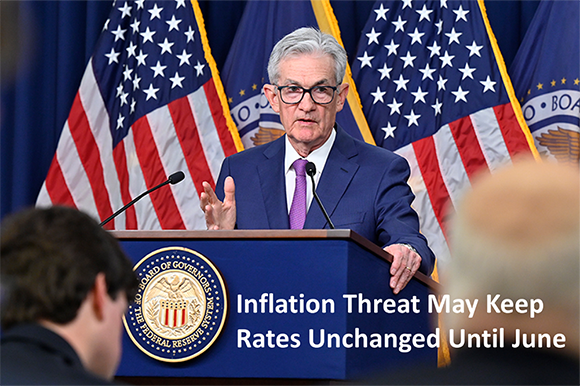
The cost of a loan to buy a home, car, college education, and achieve the American Dream is staying the same for now. As expected, Federal Reserve Chairman Jerome Powell said the central bank did not lower loan rates following the Fed’s Wednesday, Jan. 31, 2024, policy meeting. The Federal Open Market Committee (FOMC), a 12-member committee of bankers who have sworn to pursue policies promoting full employment and price stability, next meets March 19 and 20. For months, as we’ve reported previously, a rate cut was not expected until mid-2024. Predicting whether the FOMC will to begin to lower lending rates in March or wait until its following meeting on June 12 is likely to be the subject of speculation for the next three or five months, here’s what you need to know. In its post-meeting monetary policy statement released Wednesday, the FOMC said inflation has “eased over the past year but remains elevated.” The 12-month inflation rate slowed to the Fed’s 2% target in December. This is an important milestone. Ending inflation without causing a recession is unprecedented in modern history. However, hitting the target rate is not enough. The destructive impact of inflation on mass financial psychology, a problem first identified and researched by behavioral finance researchers only over the past two decades, makes it likely the FOMC will wait until June to lower rates. Inflation is so insidious, it must be eradicated convincingly. That’s why the FOMC is likely to wait until mid-year to ease credit conditions. In addition, the strength of the job market, despite one of the most aggressive monetary tightening campaigns in U.S. history, gives the FOMC room to hold its course in its anti-inflation campaign. With 1.4 job openings for every job seeker, the economy is poised to grow over the six or eight weeks immediately ahead. Normally, job seekers outnumber new-job opportunities, but the job market is upside down now. This anomaly is important and makes it more likely the economy will continue to grow while inflation psychology fades from memory. As the job glut gets filled in the months ahead, more Americans will be added to payrolls, earning income, and spending more. Nothing contained herein is to be considered a solicitation, research material, an investment recommendation, or advice of any kind, and it is subject to change without notice. Any investments or strategies referenced herein do not take into account the investment objectives, financial situation or particular needs of any specific person. Product suitability must be independently determined for each individual investor. Tax advice always depends on your particular personal situation and preferences. You should consult the appropriate financial professional regarding your specific circumstances.
The material represents an assessment of financial, economic and tax law at a specific point in time and is not intended to be a forecast of future events or a guarantee of future results. Forward-looking statements are subject to certain risks and uncertainties. Actual results, performance, or achievements may differ materially from those expressed or implied. Information is based on data gathered from what we believe are reliable sources. It is not guaranteed as to accuracy, does not purport to be complete, and is not intended to be used as a primary basis for investment decisions.
This article was written by a professional financial journalist for Advisor Products and is not intended as legal or investment advice. |